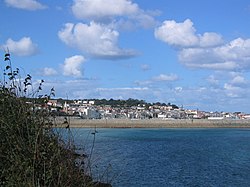St Peter Port
| Saint Peter Port | |
| Bailiwick of Guernsey | |
|---|---|
 View of St Peter Port from the South | |
| Location | |
| Island: | Guernsey |
| Location: | 49°27’26"N, 2°32’7"W |
| Data | |
| Population: | 16,488 |
| Local Government | |
| Parliamentary constituency: |
St Peter Port North St Peter Port South |
Saint Peter Port is the capital of Guernsey as well as the island's main port. The population in 2001 was 16,488. In Guernésiais and in French, historically the official language of Guernsey, the name of the town and its surrounding parish is St Pierre Port. The "port" distinguishes this parish from St Peter's (Saint Pierre Du Bois).
St Peter Port is a small town consisting mostly of steep narrow streets and steps on the overlooking slopes. It is known that a trading post and town has existed here since before Roman times, the pre-Christian name of which has not survived into the modern era.
People from St. Peter Port, were nicknamed "les Villais" (the townspeople) or "cllichards" in Guernésiais.
Geography
St Peter Port is on the east coast of Guernsey. It borders St Sampson's in the north, The Vale in the northwest, St Andrew's in the west and St Martin's in the south.
The land in the North and by the harbour is low lying but in the South, the land gets much higher (but not as high as St Martin's or the Forest). This means that there are quite a few cliffs on the coast between Havelet and Fermain.
Saint Peter Port is subdivided into four cantons:[1]
- Canton 1 or North Canton
- Canton 2 or Canton of the North-West
- Canton 3 or Canton of the South-West
- Canton 4 or Canton of the South
In addition, the islands of Herm and Jethou belong to the parish,[2] but are not part of any canton. They belong to Electoral district Saint Peter Port South.[3]
Features

The features of the town include:
- The Royal Court House, seat of the States of Guernsey
- Hauteville House, Victor Hugo's house of exile (now a museum run by the city of Paris)
- The Town Church, the parish church of St Peter Port at the heart of the town
- St Peter Port Harbour
- Castle Cornet, the historic fortress that guarded the strategic entrance to the port. The castle was formerly a tidal island that has been joined by a breakwater to the enlarged harbour since 1859
- Elizabeth College founded in 1563 by Queen Elizabeth I. The main building (built 1826) is a prominent feature of the skyline
- The market, the Arcade, the High Street and the Pollet, which are all part of the shopping district
- The Guernsey Aquarium, situated in fortified tunnels built by the Nazis during the German Occupation
- Footes Lane